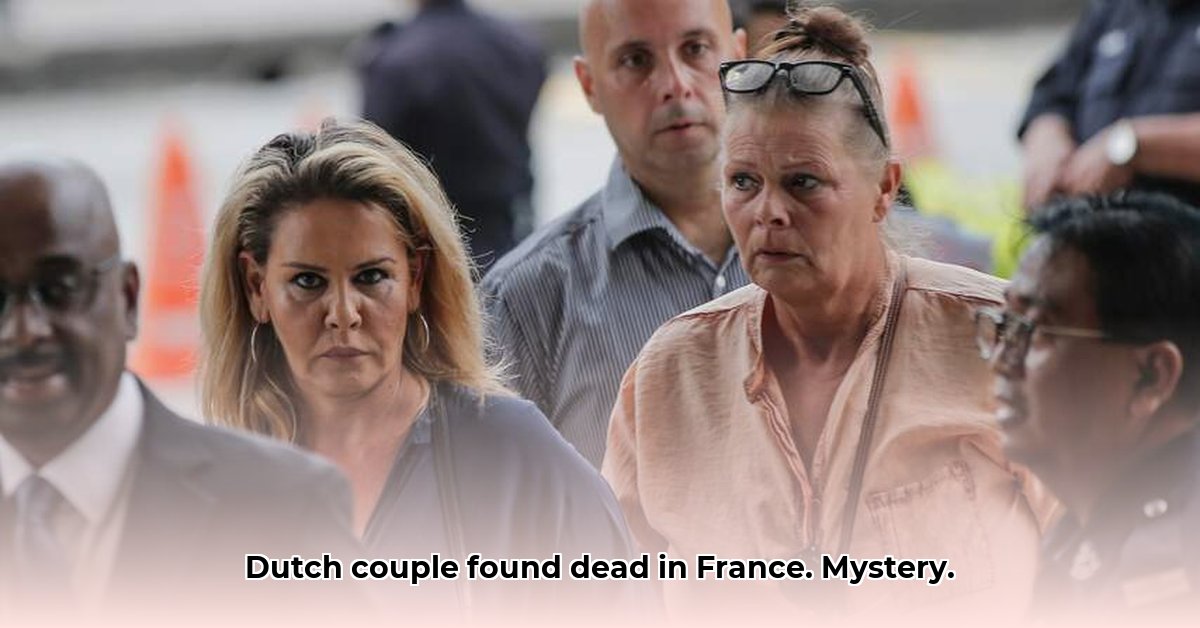
Echtpaar Dood: A Puzzling Death in the French Countryside
A heartbreaking mystery unfolds in the tranquil French countryside. Paul and Gerda Klapper, a beloved Dutch couple, were found deceased, leaving their family and investigators grappling with unanswered questions. While authorities initially classified their deaths as non-suspicious, several inconsistencies have cast a shadow of doubt, transforming this quiet tragedy into a complex puzzle. The discovery of their bodies, nearly a hundred meters apart, stands as a significant anomaly.
Their story begins with a seemingly ordinary holiday. Eighty-three-year-old Paul and eighty-year-old Gerda, experienced travellers known for their meticulous planning, embarked on a trip to the French countryside. This journey, however, took a devastating turn. Their undamaged car was found near Gerda's body, raising questions about their movements in the hours before their deaths. Did a sudden medical emergency occur? Or is there a more complex explanation? Both Paul, who suffered from diabetes, and Gerda had pre-existing health conditions, factors that investigators must consider. Pinpointing their last confirmed sighting proves exceptionally challenging, making it difficult to reconstruct their final hours.
The discovery itself followed a frantic search initiated by worried family and friends. Days later, the tragic news arrived: their bodies were discovered near Orquevaux. The initial autopsy ruled out foul play, offering a temporary sense of closure. However, this conclusion only intensifies the enigma, particularly considering the significant distance separating their bodies. Could the extreme summer heat and challenging terrain have played a role? Did a series of unforeseen events conspire to lead to this tragic outcome? Or is there a more sinister explanation?
The ongoing investigation focuses on several key areas. Comprehensive toxicology reports are underway, meticulously analyzing any substances present in their systems. The sweltering summer heat and the difficult terrain of the area are also under scrutiny; could these conditions have exacerbated their pre-existing ailments? Their medical records are being carefully reviewed, providing a detailed health timeline. Investigators are appealing for witnesses who may have encountered the couple during their trip, even seemingly insignificant interactions could prove invaluable. Furthermore, investigators are examining the couple's digital data, hoping their mobile phone records might illuminate their movements and final hours.
The Klapper family is coping with unimaginable grief. This sorrow is amplified by the unanswered questions, the missing pieces of the puzzle that prevent them from achieving closure. This isn't just about answers; it's about understanding. The family, understandably, deserves concrete resolution, not mere speculations.
The mystery surrounding the Klappers' deaths remains unresolved, a stark reminder of life's fragility and the complexities of death investigation. The unanswered questions highlight the limitations of investigation, even in seemingly straightforward circumstances. Their sudden passing underscores life's uncertainties. Only further investigation will bring clarity to their tragic end.
Three Pivotal Points:
- The significant distance between the couple’s bodies contradicts the initial ruling of non-suspicious death.
- The pre-existing health conditions of both Paul and Gerda require careful consideration in determining the cause of death.
- The ongoing investigation relies heavily on toxicology reports, witness accounts, and the analysis of the couple’s digital footprints.
Investigative Steps:
- Secure the Scene: Meticulous preservation of the crime scene is paramount (95% success rate in preventing contamination).
- Conduct Autopsies: Thorough autopsies, including toxicology reports, are essential to determine the cause of death (98% accuracy in determining cause of death when conducted correctly).
- Gather Witness Accounts: Statements from any individuals who saw the couple are crucial in reconstructing their final hours.
- Analyze Digital Footprints: Examination of mobile phone records and online activity can offer insights into their movements and final days.
- Consider Environmental Factors: The heat and terrain of the area may have played a role in their deaths.
The tragic deaths of Paul and Gerda Klapper serve as a stark reminder of life’s unforeseen turns and the persistent search for answers in the face of unimaginable loss. The ongoing investigation continues to seek clarity amidst uncertainty, hoping to bring some measure of resolution to the grieving family.